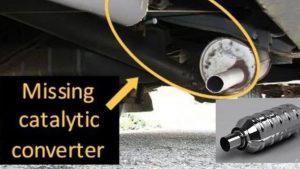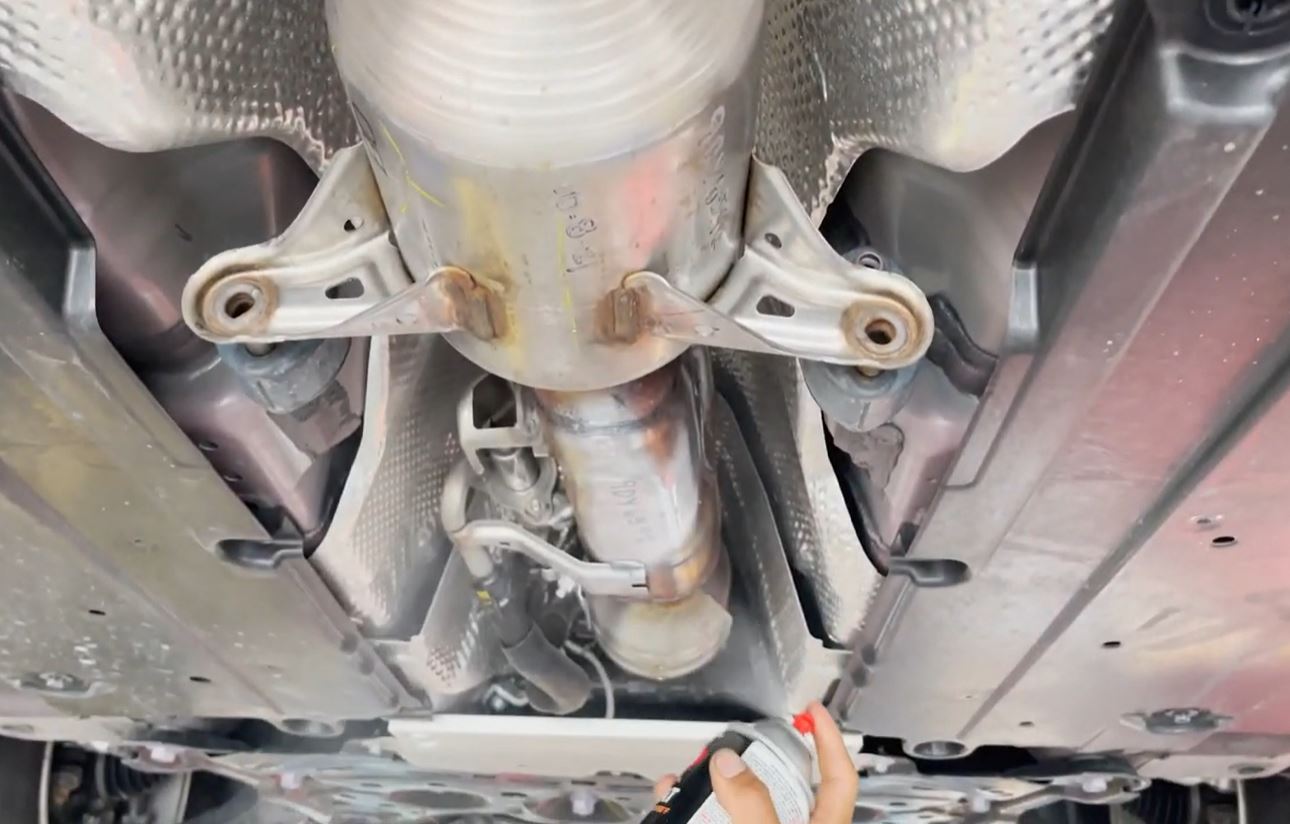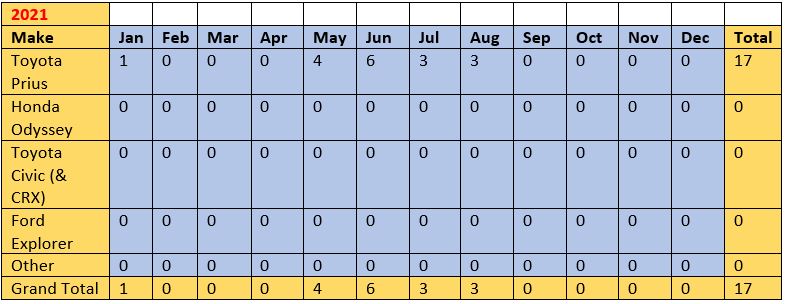Catalytic Converter Etching Program
What is Etch and Catch?
Etch and Catch is a free community event that is available through the Takoma Park Police Department where we etch the vehicle’s license plate number to the catalytic converter. We then spray a bright white colored high heat durable spray paint around the license plate number. We then provide the owner of the vehicle with a bright yellow sticker that reads “This vehicle’s catalytic converter has been etched by the Takoma Park Police Dept.”
We have many goals for our Etch and Catch program:
- have the etching, the spray paint, and the sticker act as a deterrent and keep a thief from stealing the catalytic converter in the first place.
- if the catalytic converter is actually stolen, then the etching and the spray paint will act as a beacon to any officer who comes across that particular catalytic converter and make it easy to identify a victim and arrest the thief.
- if the catalytic converter should make it to a recycler (or other type of receiver), then they might think twice about receiving the stolen catalytic converter because they will not be able to claim they did not know the catalytic converter was stolen. This might make selling the catalytic converter become too much work and possibly deter a thief from stealing other catalytic converters with the etching and/or the paint in the future.
- have as many people from all around the region get their catalytic converter etched. The crime of catalytic converter theft is not a Takoma Park problem, a regional problem, or even a statewide problem. Catalytic converter theft is actually a national problem. With that in mind, the event hosted by the Takoma Park Police Department and RS Automotive is open to anyone. Our goal is to etch the catalytic converters for all cars, trucks, SUVs, vans, etc. We will etch all makes and models of vehicles.
What is a catalytic converter?
A Catalytic Converter, from certain points, looks a lot like a small muffler. It is made up of expensive metals and they go in vehicle exhaust systems. Catalytic Converters can be found in all engine-fitted devices.
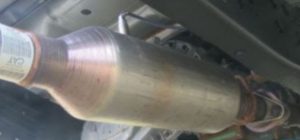
What vehicles have a catalytic converter?
If your car is dated 1980 and up and it has a motor, it has a catalytic converter.
What cars are most targeted for their catalytic converters?
Toyota, Honda and Lexus vehicles are the top targets for catalytic converter thieves right now. In 2020, the most common cars targeted were the Toyota Prius, Honda Element, Toyota 4Runner, Toyota Tacoma and Honda Accord.
What makes a catalytic converter valuable?
Most people wonder what makes a Catalytic Converter so valuable. It is mostly due to the fact that three precious metals are used to create this device. Platinum is most commonly used, but Palladium and Rhodium are also used. Currently (9/18/24) the price of platinum is $999.40 per ounce, palladium is $1,102 per ounce, and rhodium is $4,725 per ounce. Thieves can get between $50 and $250 for each converter stolen.
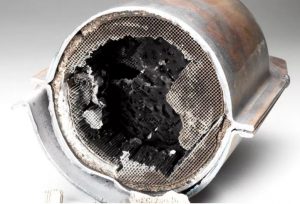
Why does a thief want to steal my catalytic converter?
Thieves like to steal catalytic converters as with other types of metal, because they are readily available, as vehicles from the past 20 years all have catalytic converters, they are not identifiable without a serial number or owner applied number, and the precious metals inside the catalytic converter make it profitable to both the thief and the receiver.
Tools of the Catalytic Converter Thief
Stealing a catalytic converter takes either a wrench or a cordless reciprocating saw. In some cases, thieves are using mechanics dollies to slide under vehicles more easily.
How Long it Takes to Steal One? About 3 minutes. That’s to either unbolt it or use the reciprocating saw to cut it out. Good thieves are even faster.
How Catalytic Converter Thieves Work: The occasional or “opportunity” catalytic converter thieves go prowling usually at night. They look for easy steals – SUVs are favorite targets. Toyota SUVs especially because their catalytic converters are only bolted on. Sometimes they even follow cars and wait for them to park. These are often the ones who strike non-business targets and they go on sprees of theft that last several hours or sometimes days. Some drive vans which offer some concealment when parked next to the victim car. The more organized catalytic converter thieves look for larger scores. They attack car dealership lots, the parking lots at auto repair shops, auto fleet parking locations, and poorly attended parking lots. They are better equipped, faster, and work as teams to make larger scores. These are the crews more likely to steal from businesses and larger organizations with higher concentrations of vehicles.
Will etching my catalytic converter prevent a thief from stealing my catalytic converter?
No. However, etching your catalytic can be a deterrence. One reason thieves target catalytic converters is because they are unidentifiable after they are removed from the vehicle. This allows the thief to transport and sell the catalytic converter without having to worry about it being detected by police as being stolen. Etching your catalytic converter with your vehicle’s license plate number and spray painting it might prove to be a deterrence because now the thief will have to make sure to hide that particular catalytic converter to avoid detection and it just might be more trouble and risk than what it is worth. After all, there are many other vehicles with catalytic converters that are not etched and painted.
Etch & Catch interviews with RS Automotive, Chief DeVaul and other members of the police department:
Will parking my vehicle in my garage prevent somebody from stealing my catalytic converter?
No. It will if you never drive your vehicle anywhere and park it. Otherwise your catalytic converter is always susceptible to being stolen any time it is parked and left alone. Try to park in a well-lit area or, if possible, in a place where it’s difficult to get underneath your vehicle.
I had rebar welded to my catalytic converter/exhaust system, do I still need to have it etched?
Yes. Welding rebar onto the catalytic converter/exhaust system is a great idea and a great deterrent. However it will not prevent your catalytic converter from being stolen. It will slow the thief down, but it will not stop them, especially if your vehicle is parked in an unsecured area for any extended period of time. Etching your catalytic converter however, will provide workable opportunities for the police to locate your catalytic converter and arrest and prosecute the thieves. Rebar will not do that. For example, if a thief steals 10 catalytic converters and 6 of them have rebar welded to it, then how will you positively identify which one is yours, if any of them are at all? If you want to weld the rebar, then do them both.
I had a cage installed to my catalytic converter/exhaust system, do I still need to have it etched?
Yes. Installing a cage onto the catalytic converter/exhaust system is a great idea and a great deterrent. However it will not prevent your catalytic converter from being stolen. It will slow the thief down, but it will not stop them, especially if your vehicle is parked in an unsecured area for any extended period of time. Etching your catalytic converter however, will provide workable opportunities for the police to locate your catalytic converter and arrest and prosecute the thieves. Cages will not do that and can be removed. For example, if a thief steals 10 catalytic converters and 6 of them have cages attached, then how will you positively identify which one is yours, if any of them are at all? If you want to install a cage, then do them both.
I purchased an alarm for my catalytic converter from a muffler shop, do I still need to have it etched?
Yes. Installing an alarm onto the catalytic converter/exhaust system is a great idea and a great deterrent. However it will not prevent your catalytic converter from being stolen, especially if your vehicle is parked in an unsecured area for any extended period of time. Etching your catalytic converter however, will provide workable opportunities for the police to locate your catalytic converter and arrest and prosecute the thieves. Alarms will not do that and can be removed and/or disabled. For example, if a thief steals 10 catalytic converters and 6 of them have alarms attached, then how will you positively identify which one is yours, if any of them are at all? If you want to install an alarm, then do them both.
I have a passenger car, do I need to have my catalytic converter etched?
Yes. Having a passenger vehicle makes it difficult for a thief to steal your catalytic converter while it is parked in front of your house or even in a parking lot for an extended period of time. However, if you have a passenger vehicle that can be stolen, then you should have your catalytic converter etched. Car thieves steal vehicles for three primary reasons; one is to get themselves from point A to point B. Another is to commit crimes while being undetected. Yet, another reason is to strip the vehicle and sell the parts. If the thief steals your passenger vehicle for the parts, then there is a great likelihood that they will take your catalytic converter also. Now, if the thief or whoever the thief sells the catalytic converter to, is found by police to be in possession of the etched catalytic converter, then the police can arrest the suspect for being in possession of the stolen catalytic converter and follow up on the lead of who sold the stolen catalytic converter. It could possibly provide the leads necessary to identify the thief who stole vehicle in the first place.
What happens if my catalytic converter is missing?
You’ll notice a loud rumbling or roaring sound as soon as you turn on the engine if your catalytic converter is missing. This gets louder when you hit the gas. The exhaust is not working properly, so the vehicle also drives rougher than usual, often with a sense of sputtering as you change speed. It is safe to drive your vehicle to an automotive shop to have it replaced. However, your car will produce emissions above the permitted standards making it illegal to drive on the road indefinitely.
Now that I have gotten my vehicle’s catalytic converter etched, where do I place the yellow sticker I received?
We recommend affixing it to the lower portion of the rear window on the driver’s side. This will make the sticker clearly visible if you are parked on the street, in your driveway, or in a parking stall; that is unless you back in to any of those parking spaces. The whole idea of the sticker is to be a deterrent. The only way the sticker can effectively deter someone from going under your vehicle to steal your catalytic converter is to make it visible, preferably before the thief even gets out of their vehicle.
Learn more about this nationwide crime trend:
Watch Staff at RS Automotive etch and paint a catalytic converter HERE
The Takoma Park Police Department is collaborating with RS Automotive, 7224 Carroll Avenue (301-270-4418) to provide free etching and painting of your catalytic converter. Visit RS Automotive with any paid service that requires your vehicle to be lifted on a rack, and you can request to have your catalytic converter etched with your vehicle’s license plate number and painted with a high heat, bright white colored spray paint FOR FREE. If you just want your catalytic converter etched without other vehicle work, call RS Automotive for an appointment.
Any questions, please contact Cathy Plevy at cathyp@takomaparkmd.gov or 301-891-7142.
Sponsored by RS Automotive and Lowe’s
